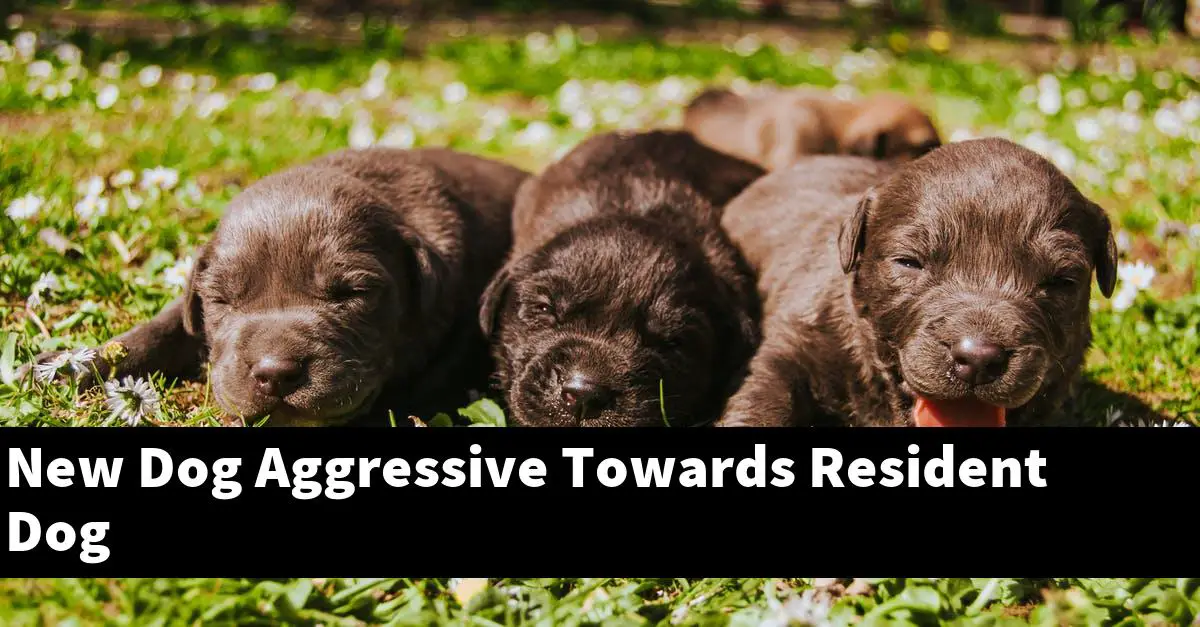If you have a new dog that is being aggressive towards your resident dog, there are a few things you can do to help the situation.
First, make sure that your new dog is getting enough exercise and mental stimulation. A tired dog is a happy dog and is less likely to be aggressive.
Secondly, continue to socialize your new dog by taking him to dog parks, obedience classes, and doggy day care. This will help him to be comfortable around other dogs. Finally, if the aggression is severe, you may need to consult with a professional trainer or behaviorist.
The article will be discussing ways to help a new dog become less aggressive towards a resident dog.
Table of Contents
Why is my new dog aggressive towards my resident dog?
There are many potential reasons why a new dog may be aggressive towards a resident dog. Some common reasons include jealousy, insecurity, and a lack of socialization.
Jealousy is a common emotion in dogs, and it can often manifest as aggression. If the new dog feels like he is competing for your attention and resources with the resident dog, he may lash out in an attempt to assert his dominance.
Insecurity is another common reason for aggression. The new dog may feel threatened by the resident dog and may act out in an attempt to protect himself. This is often seen in dogs who were not properly socialized as puppies and lack confidence around other dogs.
Finally, a lack of socialization can also lead to aggression. If the new dog has not had much exposure to other dogs, he may be fearful and react aggressively when he encounters another dog for the first time.
What can I do to stop my new dog from being aggressive towards my resident dog?
If you have a new dog that is being aggressive towards your resident dog, there are a few things you can do to try to stop this behavior. First, make sure that you are feeding the new dog and the resident dog separately.
This will help to avoid any resource guarding that may be happening. Second, provide the new dog with plenty of exercise. A tired dog is a good dog. Be sure to walk or run the new dog before bringing him or her into the home.
This will help to burn off some of that excess energy. Finally, provide the new dog with plenty of opportunities to socialize with other dogs. This can be done through dog parks, dog daycare, or even just taking him or her for walks in the neighborhood. With time and patience, the new dog will learn to coexist peacefully with the resident dog.
Why does my dog act so aggressive towards other dogs?
There can be several reasons why a dog may act aggressively towards other dogs. It could be that the dog is not well socialized and lacks exposure to other dogs, which can make them feel anxious or scared.
Another possibility is that the dog has had a bad experience with another dog in the past and is now acting out of fear or mistrust. It’s also possible that the dog is simply acting on instinct and is trying to protect its territory or pack. Whatever the reason, it’s important to seek professional help if your dog is exhibiting aggressive behavior.
A behaviorist or trainer can help you assess the situation and come up with a plan to help your dog learn how to interact safely and appropriately with other dogs.
How long does it take for a dog to adjust to a new dog?
When you introduce a new dog into your home, there are a few things to keep in mind to help make the transition go as smoothly as possible. Dogs are social creatures and generally do well when they live in a pack, so adding a new furry friend to the family can be a great experience for everyone involved.
But, as with anything new, there will be an adjustment period. Here are a few things to keep in mind when introducing a new dog to your home.
The first few days will be the most chaotic as the new dog gets acclimated to their new surroundings. It’s important to give them time to adjust and not try to force them into any situations they’re not comfortable with. Allowing them to explore their new home at their own pace will help them feel more relaxed and secure.
It’s also important to introduce the new dog to the other dogs in the household gradually. A good way to do this is to have the first meeting take place in a neutral location, like a park.
This will allow the new dog to get used to the other dogs without feeling like they’re being territorial. After the initial meeting, you can start slowly integrating the new dog into the pack by letting them sleep in the same room or taking them on walks together.
There’s no set time frame for how long it will take a new dog to adjust to their new home, but it’s important to be patient and give them the time they need. With a little patience and understanding, you’ll soon have a new furry friend that’s fully integrated into the family.
Can you fix an aggressive dog?
There are a number of ways to help an aggressive dog, but it depends on the severity of the aggression and the cause. If the aggression is caused by fear or anxiety, behavior modification techniques can be used to help the dog feel more comfortable and less fearful.
If the aggression is caused by frustration or excitement, management techniques can be used to help the dog stay calm and avoid situations that trigger the aggression. In some cases, medication may be necessary to help the dog relax and respond to behavior modification or management techniques.
Why is my dog suddenly aggressive towards certain dogs?
There are several potential reasons why a dog may become aggressive towards other dogs. It could be that the dog is feeling territorial or protective of its owners and is reacting to another dog that it perceives as a threat. It could also be that the dog is fearful or anxious around other dogs and is acting out in aggression in order to keep them away. Additionally, some dogs may simply be more prone to aggression due to genetics or past experiences.
If a dog has aggression towards other dogs, it is important to seek professional help in order to determine the underlying cause and to create a behavior modification plan to help the dog learn to cope with its aggression in a more appropriate way.
How do you stop a dog from being aggressive to other dogs?
If you have an aggressive dog, the best thing you can do is to seek professional help. A behaviorist or trainer can help you to modify your dog’s behavior and make them less aggressive.
There are a number of things you can do to help stop your dog from being aggressive to other dogs. You should start by socializing your dog early on and exposing them to as many different people and animals as possible. This will help them to be less fearful and more comfortable around others.
You should also avoid situations that trigger your dog’s aggression. If you know that your dog becomes aggressive when other dogs come too close, make sure to keep them at a distance from other dogs. If your dog is aggressive when you are walking them, try walking them in areas where there are not many other people or animals around.
In addition, you should train your dog to obey commands such as ‘sit’, ‘stay’, and ‘come’. This will help you to better control your dog in situations where they might otherwise become aggressive. Finally, make sure to provide your dog with plenty of exercise and mental stimulation. A tired dog is less likely to be aggressive.
Can you change an aggressive dog?
Dogs can be aggressive for a variety of reasons, including fear, territoriality, possessiveness, and hunger. While it is possible to change an aggressive dog’s behavior, it is important to understand the underlying cause of the aggression before attempting to treat it.
aggression is a learned behavior, it is often difficult to change. However, with patience, consistency, and positive reinforcement, it is possible to change an aggressive dog’s behavior.
If your dog is displaying aggression, it is important to consult with a professional behaviorist or veterinarian to find out the underlying cause of the aggression. Once the cause is determined, a treatment plan can be put in place to help change the dog’s behavior.
Treating aggression can be a long and difficult process, but it is important to remain patient and consistent. With time and patience, you can help your dog overcome his aggression and live a happy and healthy life.
Can aggressive dogs be changed?
It is possible to change the behavior of an aggressive dog, but it takes time, patience, and professional help. The first step is to identify the triggers that cause the aggression. Once the triggers are identified, you can begin to work on desensitizing the dog to those triggers.
This is done by slowly exposing the dog to the trigger in a controlled environment while providing positive reinforcement. The goal is to help the dog associate the trigger with something positive instead of something negative. This process can be difficult and it is important to work with a professional trainer or behaviorist to ensure that it is done correctly.
Can an aggressive dog be cured?
Yes, an aggressive dog can be cured. However, it is important to note that there is no one-size-fits-all solution to aggression in dogs. The approach that is taken to curing aggression will vary depending on the individual dog and the underlying causes of the aggression.
There are many different possible causes of aggression in dogs. Some dogs may be aggressive due to genetics, while others may be aggressive due to a lack of socialization or due to prior traumatic experiences. Still other dogs may become aggressive in response to a medical condition or due to pain.
The first step in curing aggression in a dog is to identify the underlying cause of the aggression. Once the cause is identified, a treatment plan can be put in place. Treatment for aggression may include behavior modification, desensitization and counterconditioning, medication, and/or management. It is important to work with a qualified professional when developing a treatment plan for an aggressive dog.
Conclusion
If you have a new dog that is aggressive towards your resident dog, there are a few things you can do to help them get along. First, try to keep them separated when you are not home so they can’t fight. If they are fighting when you are home, break it up immediately and separate them.
Secondly, provide each dog with their own food and water bowls and don’t let them eat or drink from each other’s. Lastly, give each dog plenty of exercise so they are less likely to fight over territory. With some patience and time, your dogs should be able to get along.


